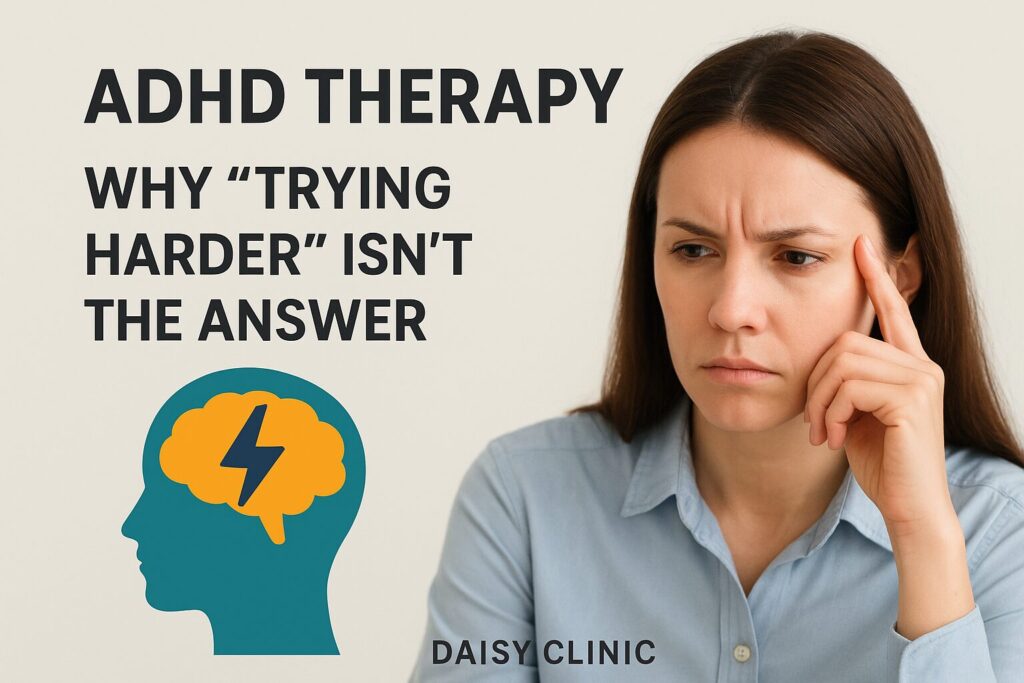If you or someone you love has Attention-Deficit/Hyperactivity Disorder (ADHD), you’ve likely heard the same well-meaning but frustrating advice: “Just try harder,” “Focus more,” or “Get a better planner.” For the neurodivergent brain, this advice isn’t just unhelpful—it can be deeply shaming. It misunderstands the fundamental truth about ADHD: it’s not a deficit of character, but a difference in neurology.

The ADHD Brain: Wired Differently
Neuroscience shows that ADHD brains are uniquely wired. Brain imaging studies reveal differences in networks responsible for sustained attention, inhibitory control, and motivation (Cortese et al., 2012). ADHD is also linked to dopamine system dysregulation, which affects reward processing and focus (Volkow et al., 2009).
This explains why someone with ADHD can hyperfocus for hours on an engaging video game yet struggle to start a simple email. The brain isn’t broken—it just operates on a different kind of fuel.
Why Traditional Talk Therapy Often Falls Short
For many conditions, traditional talk therapy works well. But ADHD is less about insight and more about execution. Research shows that individuals with ADHD often understand what needs to be done, but face difficulties bridging the gap between intention and consistent action (Barkley, 2011).
Talking about time management strategies won’t fix time-blindness. And discussing organization doesn’t help much if working memory makes task initiation nearly impossible. Without the right approach, therapy can leave clients feeling frustrated and ashamed.
A New Approach: ADHD-Friendly Therapy
The good news? Therapy can be adapted to work with the ADHD brain. Approaches sometimes called near-psychotherapy integrate somatic (body-based) strategies, mindfulness, and executive-function coaching.
Here’s how it helps:
1. Building the “Pause” Button
Impulsivity in ADHD is often physiological. Somatic awareness techniques help individuals recognize early body cues—like restlessness or tension—so they can pause before reacting (Mehling et al., 2011).
2. Moving from Shame to Self-Compassion
ADHD carries a heavy burden of shame due to repeated criticism over “simple” tasks. Reframing challenges—lateness as time-blindness, forgetfulness as a working memory hiccup—creates space for compassion instead of self-blame (Harpin, 2005).
3. Practicing Executive Skills in Real Time
Instead of only talking about organization, therapy sessions can include task breakdowns, planning tools, and hands-on practice. This builds executive functioning skills in ways that stick.
4. Focusing on Strengths, Not Just Deficits
The ADHD brain is often creative, curious, and passionate. Therapy that highlights strengths—like using hyperfocus for meaningful projects—helps individuals thrive rather than just cope.
ADHD Counseling in Bellevue and Beyond
Managing ADHD isn’t about “trying harder.” It’s about finding strategies and support tailored to the neurodivergent brain. With the right approach, individuals can regulate emotions, strengthen executive functions, and live confidently, without the weight of shame.
If you’re searching for ADHD therapy in Bellevue or looking for ADHD counseling near me, Daisy Clinic in Washington state (Bellevue, Seattle etc.) provides compassionate, evidence-based care designed for the unique needs of neurodivergent individuals.